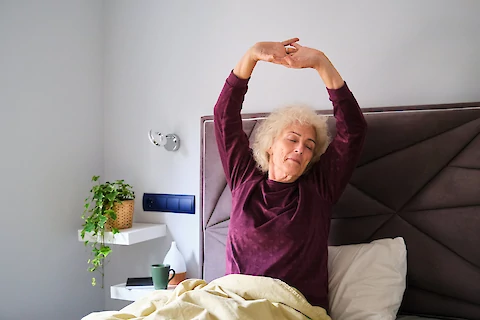
Part of being a family caregiver is helping seniors adjust their routines. Maintaining a consistent sleep schedule is critical to senior health and well-being. Daylight savings time can disrupt that, making it difficult for seniors to stay on track. With some adjustments, you can help ease senior loved ones into the new normal while ensuring their sleep quality doesn’t suffer.
The Impact of Time Change on Seniors
Daylight saving time changes can disrupt the sleep patterns of seniors more than younger individuals. Physiological changes occur in our bodies as we age, altering our internal clocks. Many seniors may experience difficulty falling asleep, staying asleep, and waking up in the morning. This can lead to sleep deprivation and other health complications, such as increased risk of falls, cognitive decline, and depression.
Practical Sleep Tips for Adjusting to Time Change
Adjusting to time changes can be particularly challenging for seniors, impacting their sleep patterns and overall well-being. Here are some practical sleep tips to help them navigate time changes more smoothly.
Encourage a Consistent Bedtime Schedule
Establishing a consistent bedtime routine can signal the body that it's time to wind down and prepare for sleep. Encourage seniors to follow a relaxing pre-sleep routine. Taking a warm bath, reading a book, or listening to calming music can help them rest better.
Gradually Adjust Sleep Schedule
Adjust the senior’s bedtime and wake time gradually to ease the transition to a new schedule. A few days before the time change, shift their sleep schedule by 15-30 minute increments. Put them to bed 15-30 minutes earlier each night leading up to the change. This helps their bodies acclimate to the new schedule.
Encourage Light Exposure
Light exposure plays a crucial role in regulating the body's internal clock. Expose seniors to natural light in the morning to help reset their internal clock. In the evening, create a calm, dark environment to signal their body that it is time to sleep.
Minimize Disruptions to Daily Routines
Encourage seniors to maintain a consistent daily routine, including mealtimes, exercise, and social activities. Consistency helps regulate the body's internal clock and promotes better sleep patterns, especially during time changes.
How Caregivers Can Help Seniors Adjust to Time Change
As a carer, you play an instrumental role in helping seniors adjust to the time shift. Patience, understanding, and careful planning can make a significant difference in managing this transition. Remember to look after your well-being during these changes. Proper rest and self-care are necessary to help you provide the best care to your loved one.
Get Assistance Caring for Senior Loved Ones From Senior Helpers
The time shift due to Daylight Savings Time can be challenging for seniors. With your help, you can make the transition less stressful for them. If you’re in Franklin, Brentwood, Nashville, Columbia, and Lewisburg and need support in caring for a senior loved one during this transition, we can help. Senior Helpers Middle Tennessee provides professional in-home senior care, including personal care, companionship, and assistance with daily living activities. Contact us to find out how we can help.